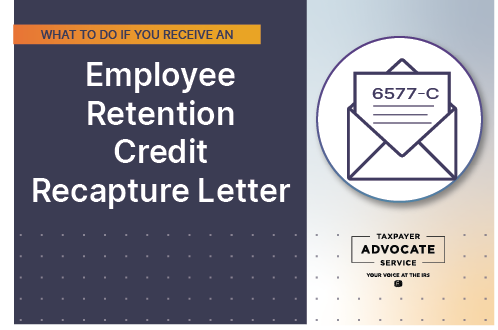

As part of its ongoing Employee Retention Credit compliance work, the IRS announced on August 15, 2024, that they will be sending up to 30,000 Employee Retention Credit (ERC) recapture letters throughout the fall months. These Letters 6577-C, Employee Retention Credit (ERC) Recapture, represent more than $1 billion in claims, mostly for tax year 2021. They notify business taxpayers that the IRS is reversing or recapturing their previous ERC credit.
This is the second round of recapture letters. Previously, the IRS sent letters to more than 12,000 entities for tax year 2020, resulting in $572 million in assessments. The latest letters generally involve larger recapture amounts since Congress increased the maximum ERC from $5,000 per employee per year in 2020 to $7,000 per employee for each quarter of the year 2021.
At the American Institute of Certified Public Accountants & Chartered Institute of Management Accountants National Tax Conference on November 12, National Taxpayer Advocate Erin M. Collins stated:
“We get a lot of people reaching out to us and saying, ‘I mortgaged my home because I thought I was going to get this ERC money so I could keep my business afloat. I need to pay this off. The interest is killing me.’ Or ‘I paid my employees out of my assets to keep them on the roll. I need this money back.’ I’ve had people saying they’re possibly going to shut down. They’re going to have these challenges so we are trying to help those individuals, and it is not as fast as I would like.”
If you receive an ERC Recapture Letter and agree to the proposed recapture amount, you should submit a signed statement and make a payment if you are able to. If you don’t submit a payment, you will receive a balance due notice, if applicable, that will include penalties and interest.
If you disagree with the proposed changes, you should send a statement explaining the reason for the disagreement and include any relevant facts that support your ERC claim.
If you don’t provide supporting documents or don’t respond to the letter, the IRS will adjust your account for the amount of the proposed change plus any applicable penalties and interest, and send you a balance due notice, if applicable.
If your ERC credit recapture causes a balance due, you may be entitled to a review by the Independent Office of Appeals (Appeals).
The IRS generally must issue a Collection Due Process (CDP) notice to taxpayers when it files a Notice of Federal Tax Lien (NFTL) or before it issues a levy. This CDP notice allows taxpayers to request a hearing before Appeals to review the filed lien or proposed levy, but you must meet certain deadlines. The notice you receive should indicate the CDP request deadline. If you received a levy notice, you must file your request for a CDP hearing on or before 30 days after of the date of the notice. If you received a lien notice, you must file your CDP request on or before 30 days after five business days following the IRS’s filing of a NFTL.
CDP requests are generally filed using Form 12153, Request for a Collection Due Process or Equivalent Hearing. During a CDP hearing, you can challenge the underlying liability, raise defenses, challenge the appropriateness of collection actions, and propose collection alternatives. After the hearing, Appeals will issue a notice of determination, which provides 30 days to request review by the U.S. Tax Court.
If you receive a CDP notice and miss the deadline to request a CDP hearing, you may request an Equivalent Hearing, generally using Form 12153. Your request for an Equivalent Hearing must be postmarked on or before the end of the one-year period after the date of the levy notice or on or before the end of the one-year period plus 5 business days after the filing date of the Notice of Federal Tax Lien. If you disagree with Appeals’ determination in an equivalent hearing, you will not be able to request review by the Tax Court. For more information about CDP, visit the TAS Roadmap – Taxpayer Requests: CDP/Equivalent/CAP or Appealing a Collection Decision at irs.gov.
If you receive a bill from the IRS, you should pay the balance due as soon as is practical. The IRS offers several options to make payments online using a bank account or credit card. Payments of any amount will help reduce future penalties and interest. If you cannot pay or cannot pay in full, there are other options.
If you are unable to pay in full, the IRS offers various payment plans. If you wish to request a payment plan, you can do so online, you can submit Form 9465, Installment Agreement Request, or you can call the IRS.
If you cannot pay the balance in full, you may submit an Offer in Compromise. This allows you to settle your tax debt for less than the full amount owed. The IRS provides a pre-qualifier tool to help determine your eligibility. Use of the tool does not guarantee offer acceptance.
You may also qualify for Currently Not Collectible Status. The IRS will analyze your ability to pay based on your income and expenses, and if the IRS agrees that you cannot currently pay, it generally will suspend collection actions. However, penalties and interest will continue to accrue.
If you have a tax problem that is causing a financial difficulty and you have tried but have not been able to resolve your issue with the IRS, TAS may be able to help. As an independent organization within the IRS, TAS works to protect taxpayer rights and can offer free help to taxpayers who qualify. Learn more about TAS by visiting our About Us page or call 877-777-4778.
It is important to remember that you have rights as a taxpayer.
You can generally resolve most notices or letters without help, but you can also get the help of a professional – either the person who prepared your return, or another tax professional.
Resources:
Want to get the latest tax news, learn more about taxpayer rights, and upcoming TAS events while looking at cute dogs and pop culture references? Look no further than TAS Social Media. Follow, like and share our content to help spread the work on how we advocate for taxpayers!
